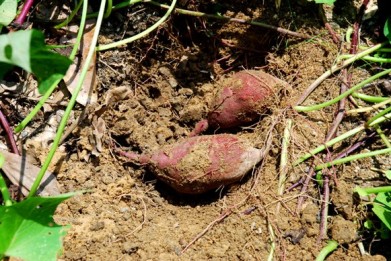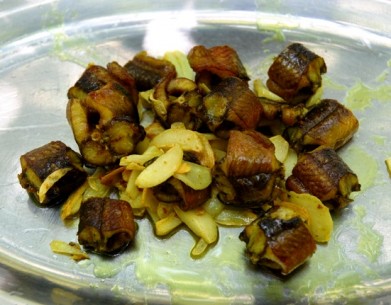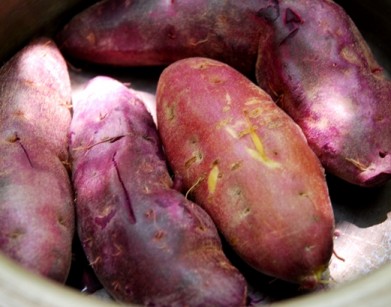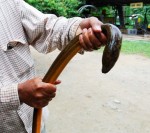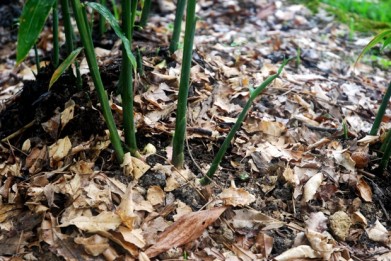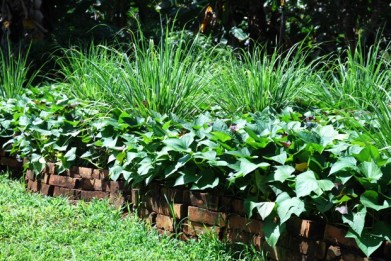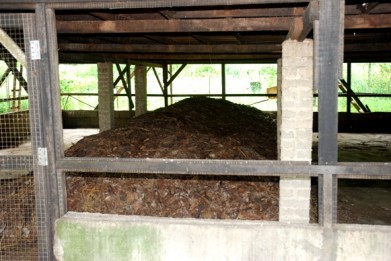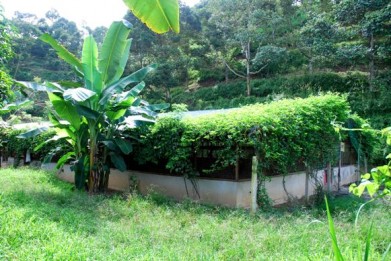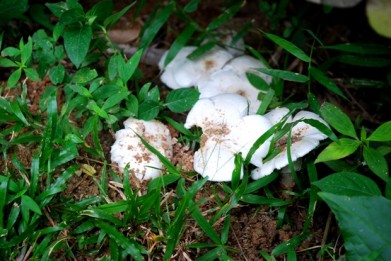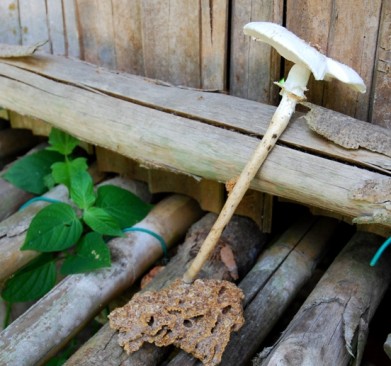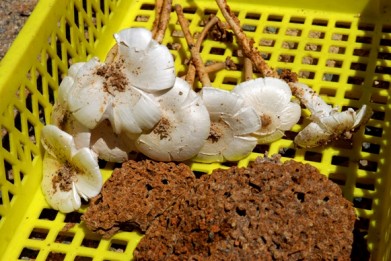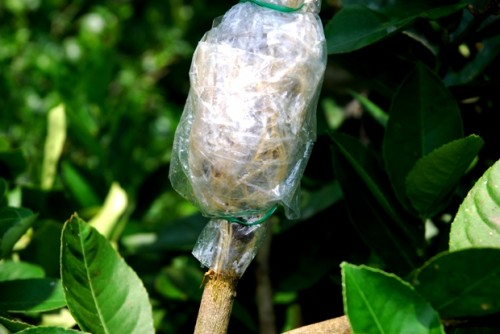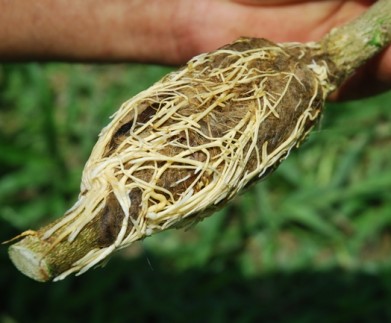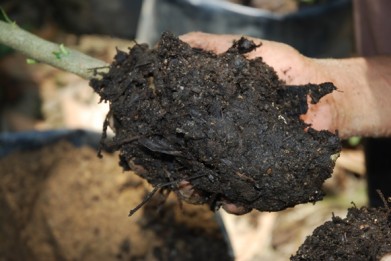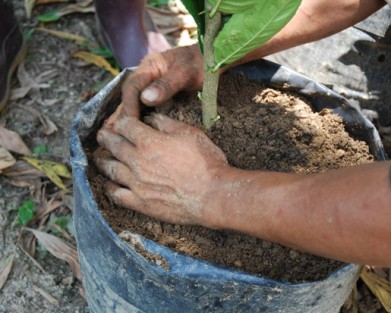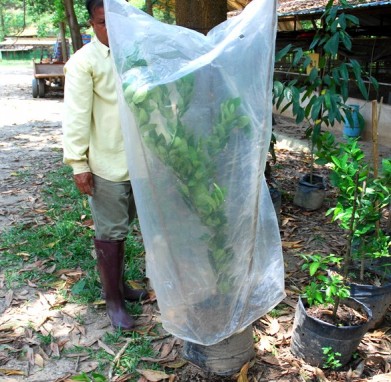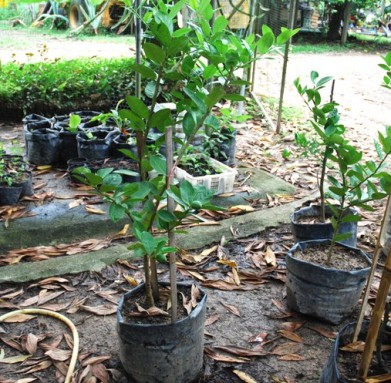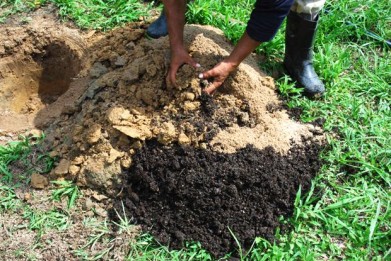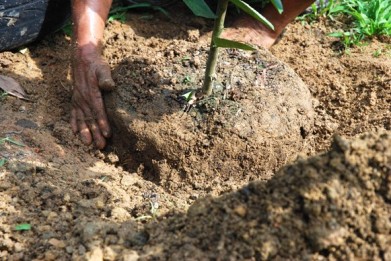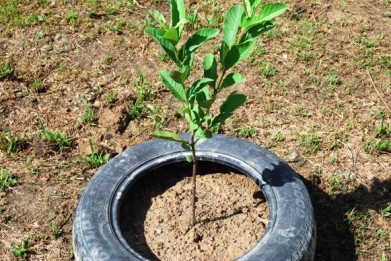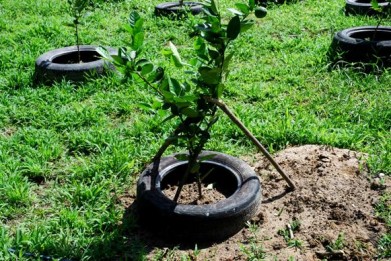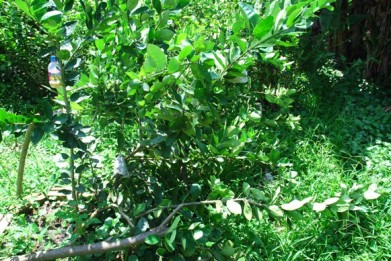Apr 25, 2011
Lunch At the Farm
The sweet potatoes are ready for harvest just 70 days after planting. That's fast, and they achieved a good size too.
We decided to have a quick lunch - plain steamed sweet potatoes, and a wild eel that was wriggling across our path as we were inspecting the sweet potatoes.
Wild eel rubbed in some kunyit (turmeric), stir-fried in grassfed chicken fat with garlic. Those of you who know good food can imagine just how delicious this dish is!
Purple and yellow sweet potatoes for their antioxidant (anthocyanin), their high fibre, and their ability to keep blood sugar levels stable ( they are a source of natural 'caiapo', a supplement for the diabetic to control blood sugar ).
To add an exotic gourmet touch to the plain steamed potato, make a dry topping of grated coconut, sugar and salt to taste. Sprinkle over bite-size sweet potato, or spoon on top of each chunky slice.
Postscript: This huge guy crossed our path a few days later. Our experiment to create a sustainable mini-scale natural fishery by slowing down sections of the stream, feeding, etc seems to be producing result.
Click on pic for close - up
12:13 Posted in Blog | Permalink | Comments (8) | Tags: eel, wild eel, sweet potato, purple sweet potato, anthocyanin, caiapo, diabetic food, diabetic superfood, slow food
Apr 13, 2011
Permaculture At The Farm II
Here are more examples of permaculture (permanent agriculture) at the farm:
Mulching to reduce water loss. Previously we advocated sheet mulching (to reduce weeds, etc ) with cardboard and other cellulose based material. DON'T DO IT! Termites love these heavy cellulose material. Mulching in humid Malaysia should be light to avoid termites and fungal problems. Leguminous cover crop as living mulch is a better idea.
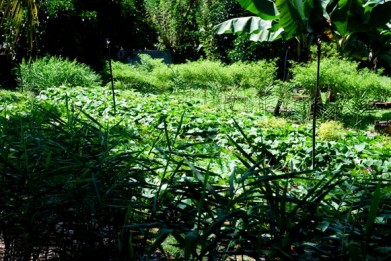
Multi-crop and companion planting of gingers, chilies, sweet potatoes, water melon and passion fruits on raised beds. Permaculture is antithetical to mono-cropping (think oil palm, or think dragon fruit farms; organic or otherwise). On a small farm level, mono-cropping often leads to increasing dependence on chemicals and crops are often decimated suddenly by disease. The recent demise of many dragon fruit farms, both conventional and organic, is one example.
Serai or lemon grass on raised beds with sweet potato as living mulch and companion. Once the sweet potatoes are harvested, leguminous cover crop will be planted to revitalise the soil.
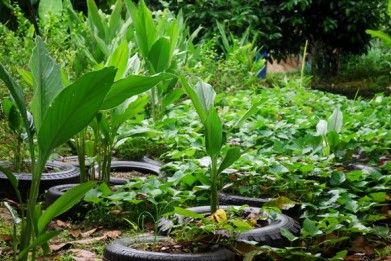
A low maintenance food garden grown entirely on used tires on low yield soggy, clayey soil. Practically no weeding is needed and monthly dressing of compost is all that's needed to produce sweet potatoes, curcuma mangga, lempoyang, kunyit and common ginger.
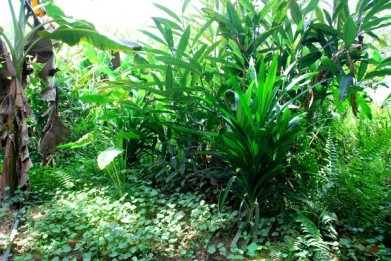
A 3000 sq ft food forest with very low maintenance, fed by a grey water treatment pond, producing taro, banana, papaya, pegaga, lengkuas, pandan, misai kucing, geranggau and other herbs. It provides a rich habitat for wild birds, eels, haruan, sepat, frogs, butterflies, insects, snakes, etc. It is one of our favorite spots in the farm. However, not everybody likes the overly 'friendly' snakes ( we counted 7 species so far ).
Under the traditional Asian chicken coop (on stilts), in-situ composting ( with the aid of farm-brewed IMOs ). This reduces human energy ( in having to remove the dung after every cycle). Removal of the composted material is done once every 8 months or so, and goes straight to the durian trees.
More examples of sun shading using plants - passionfruit, banana ( sematu, as it can reach 20 feet or more, high) and gliricidia septum.
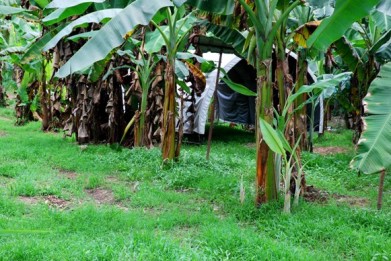
Integrating animal husbandry with fruits - here, free range chickens with bananas. There is no necessity to fertilise the fruit trees at all. Do not integrate durians with chickens.
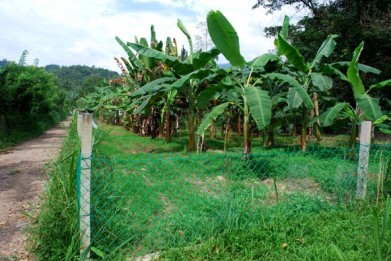
Sematu is best - it has large leaves providing good shade, grows fast and is more hardy than 'improved' bananas like mas or berangan. The sematu above are young trees, barely three months old.
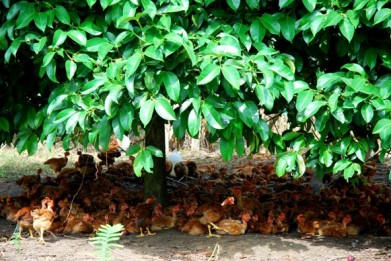
Free range chickens with mangosteen - here, hiding from the mid-day sun under the mangosteen fruit trees.
17:21 Posted in Permaculture | Permalink | Comments (2) | Tags: permaculture, free range chickens, sun shading, grey water treatment, integrated farming, permaculture examples, raised beds, companion planting, mulching, sheet mulching
Symbiotic Relationships - Ant-Hill Mushrooms
Now here's a sight for sore eyes, cendawan busut or ant-hill mushroom, termitomyces albuminosa.
The mushroom grows to the surface from the termite nest (above photo), which can be a foot (30cm) up. The entire stalk is edible and delicious.
It is one of the most delicious mushrooms, and leave ALL cultivated mushrooms miles behind in terms of taste and texture.
Unfortunately it is still not possible to cultivate this mushroom commercially. It is symbiotic with a certain termite, odontotermes spp.
The termites cultivate the mushroom by breaking down wooden material that the mushroom needs to grown on. There is speculation that the mushroom needs the dung of the termites too to grow. The termites in turn use the material decomposted by the mushroom as food.
This is called, Living Together.
11:07 Posted in Blog | Permalink | Comments (3) | Tags: cendawan busut, termitomyces albuminosa, odontotermes spp, symbiotic relationships
Apr 11, 2011
Oddity In The Forest
Came across this oddity hanging down from a vine in the forest.
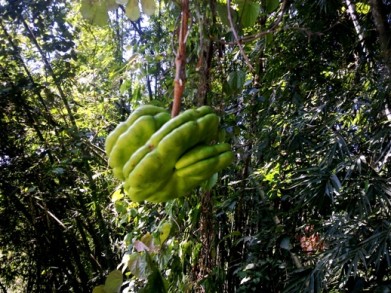
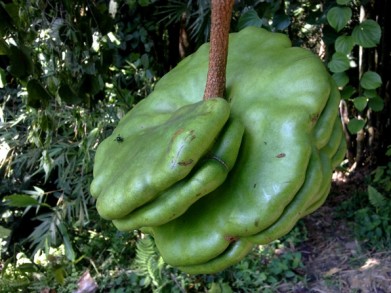
A foot across and about 6 to 8 inches thick
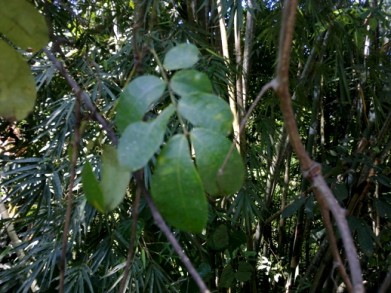
It's leaves. Sorry about the focussing, it was quite windy.
18:22 Posted in Blog | Permalink | Comments (2) | Tags: unusual plants, rainforest, rare plants
Apr 08, 2011
Marcotting II
We generally have good root formation in around 30 to 45 days for lemon trees and other limau-type trees.
Saw off, and dap some iodine on the cut
Wrap vermicast around the root ball
Plant in a polybag with a light, friable and loose soil mix. We like to add some sand and vermicast to our farm soil. Loose, light soil will encourage the roots to grow deeper.
Cover the plant with a plastic bag to prevent drying out. Remove when new leaves and branch shoots are noticeable. Once the new leaves and shoots are established, plant to soil.
The area where we are planting these citruses have heavy laterite soil. We generally dig a hole and then mix the laterite with sand and compost.
We mix the laterite with sand and vermicast or compost
Place the plant half inside the hole
A planted marcotted guava
We generally place an used tire over the spot and top up the soil mix as need be. The tire reduces weeds, and prevent leachate of compost and vermicast.
Support the young tree. Marcotted trees tend to be shallow rooted and care must be taken during windy monsoon seasons.
5 year old marcotted lemon tree falling over after a night of heavy rain and strong winds. Marcotted trees have no tap root so should be supported even when matured in windy zones.
12:37 Posted in Blog | Permalink | Comments (0) | Tags: marcotting, air layering, lemon, organic farming, permaculture









